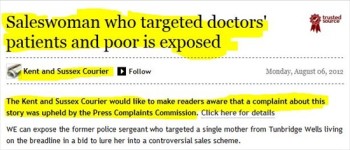
(Credit: Kent and Sussex Courier, screenshot, highlight added)
The UK Press Complaints Commission ruled that the Kent and Sussex Courier, a local newspaper in Tunbridge Wells, UK, shouldn’t have sent an undercover reporter into a doctor’s office.
The Courier’s August 2012 story “Saleswoman who targeted doctor’s patients and poor is exposed” reported on Nicki McLellan, a “receptionist in a local doctor’s surgery, who also worked in the ‘multi level marketing sector’ selling ‘wellness products,'” who while being secretly taped admitted she was promoting those products to the patients in her doctor’s office. McLellan complained about the report to the PCC.
The newspaper became interested in McLellan because McLellan had told the Courier “via a representative” she might be able to help a woman the Courier had featured in an article about “financial hardship” make some money. Despite the ruling, the Kent and Sussex Courier has left its story on its website but added a note at the top with a link to the PCC ruling published on its website. iMediaEthics notes that the report, which includes comments from interviews with patients, openly admits it was based on “a conversation we secretly recorded.” One quote of McLellan’s from that undercover tape is:
“The times I’ve been in the surgery and people say ‘I’ve tried this cream for that or that cream for so-and-so’ and then I will often say to them ‘have you tried natural products? Would you like to try one of mine?’ And that’s how I get a lot of my customers.”
But, the Courier’s secret recording didn’t pass the test under the PCC’s guidelines, the PCC explained. Those guidelines prohibit “material acquired by using hidden cameras or clandestine listening devices” and only approves the use of “misrepresentation or subterfuge” in reporting when “in the public interest” and “when the material cannot be obtained by other means.”
As the PCC’s Charlotte Dewar is quoted by the PCC as saying:
“The Commission praised the newspaper’s motives and its sense of responsibility towards a member of the local community but ultimately was not persuaded that it had been able to demonstrate, as the Code requires, that its methods had been properly considered in advance.”
Likewise, McLellan, the receptionist, argued that “she had acted with good intentions” and that the Courier didn’t try “to investigate the matter before” going undercover.
In its defense, the Courier said it was concerned McLelllan was “‘targeting’ vulnerable individuals,” according to the PCC. While calling that “praiseworthy,” the PCC said it was not sufficient enough to warrant the secret taping.
“It was clear that the investigation had uncovered material in the public interest. This could not, however, retrospectively justify the initial decision to engage in subterfuge. On balance, the Commission concluded that this had not been properly considered.”
Th PCC rejected two other complaints by McLellan about “harassment” by the reporter and inaccuracy because “contrary to a suggestion in the article, the surgery had been fully aware” of her other job. The PCC decided that the Courier hadn’t been harassing McLellan but instead following up before publication, and that the Courier’s information didn’t break accuracy guidelines because it came from the surgery.
The Courier’s editor, Ian Read, told iMediaEthics by email:
“We ran this story with the best of intentions and the PCC praised our motives and what we uncovered. While I’m disappointed with the adjudication I remain proud of this piece of investigative journalism carried out in the public interest.”
iMediaEthics asked the PCC about the Courier’s decision to leave the article published on its website with a link to the PCC ruling. The PCC’s Catherine Speller told iMediaEthics by email that the PCC standards permit leaving articles that the PCC upheld complaints against as long as the adjudication is clearly linked. Speller pointed to the PCC’s “Online prominence” guidance, which dictates in part:
“If an article has been found to be in breach of the Code by the PCC, it should either be removed from the archive and replaced by the adjudication, or a link to the upheld adjudication should be prominently displayed on the article itself. This can be discussed in advance with the PCC.”
She said that the Courier handled publishing the adjudication in a way that “meets the requirement.” Speller explained:
“The prominence of the McLellan v Kent & Sussex Courier adjudication, together with the link through to the adjudication from the original article, was agreed with the PCC prior to publication. This meets the requirement contained in the Code itself, which states:
“‘Any publication judged to have breached the Code must publish the adjudication in full and with due prominence agreed with the Commission’s Director, including headline reference to the PCC.'”
On a sidenote, the PCC noted that one of the commission’s editorial members, Peter Wright, recused himself from handling the complaint because he has “an interest in all Northcliffe Media titles.”







Comments Terms and Conditions